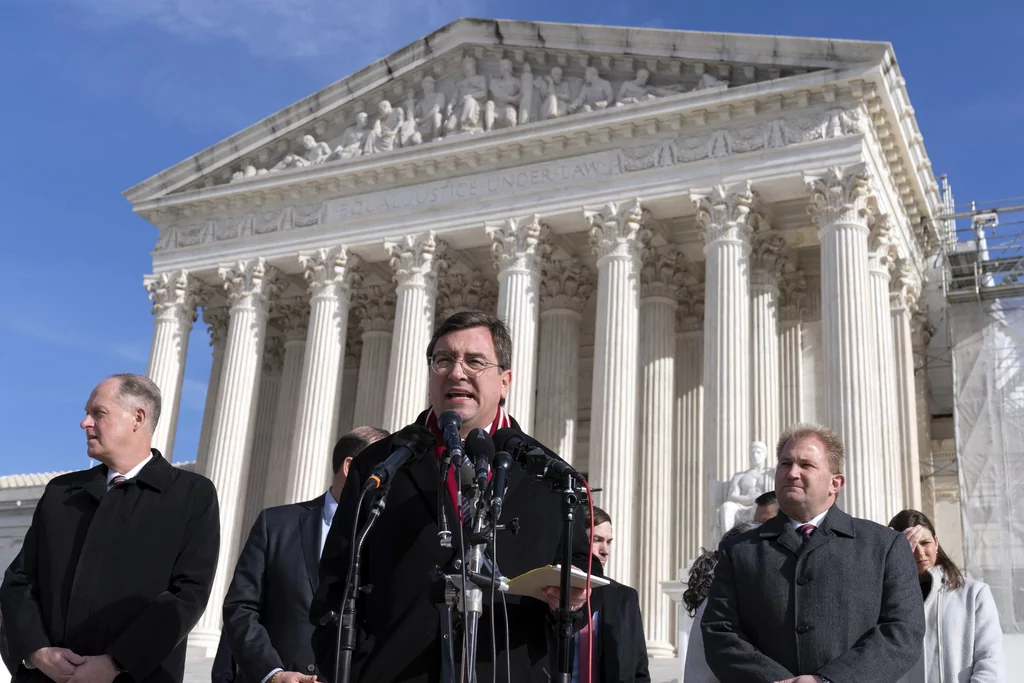
A forthcoming Supreme Court decision in a case known as United States v. Skrmetti could significantly weaken lawsuits challenging President Donald Trump’s recent executive orders related to transgender procedures for minors.
If the Supreme Court eventually rules to uphold Tennessee’s Senate Bill 1, a state ban on gender-affirming care for minors, it could erode the constitutional arguments central to challenges against Trump’s transgender-related executive orders, many of which rely on 14th Amendment equal protection claims.

“A lot of these lawsuits rest on the same Equal Protection arguments that are at the heart of Skrmetti,” Paul DuPont, policy director at the American Principles Project, told the Washington Examiner. “If the Supreme Court rules that Tennessee’s law doesn’t violate the 14th Amendment, then those legal foundations are going to be a lot weaker for challengers going after Trump’s executive orders.”
One of the most significant orders in question, issued by Trump on Jan. 28, restricts transgender procedures for individuals under age 19, prohibiting federally funded healthcare providers from offering puberty blockers, hormone therapy, or surgeries. Civil rights groups, including the American Civil Liberties Union, Democratic state attorneys general, and private parties, have filed lawsuits arguing that the policy violates constitutional protections and federal healthcare laws.
The order signed on Jan. 28 has been temporarily blocked by a federal judge, preventing its enforcement while legal challenges proceed. Separately, two orders targeting transgender military members and prisoners have been temporarily halted as litigation continues.
Conservatives push for protection of children
Conservative backers of Trump’s executive order argue restrictions such as halting transgender treatments for people under 19 are necessary to prevent irreversible harm to vulnerable children.

Prominent detransitioner Chloe Cole, 20, who began puberty blockers and testosterone at age 13 and underwent a double mastectomy at 15, has become a leading voice in support of measures such as Tennessee’s law. Speaking outside the Supreme Court on Dec. 2, Cole emphasized the need for protections that prevent minors from making life-altering decisions they may later regret.
In an interview with the Washington Examiner, Cole said, “I think it’s definitely possible that this could be ended in the United States within the next four years. We have the greatest opportunity now, more than ever, which is exactly why we have to keep going full steam ahead. We can’t get complacent. … If we stop moving, it could all fail. Everything could go backwards and be worse than it was just a few years ago.”
Cole’s activism preceded others who have come forward in recent months, including Kaya Clementine Breen, 20, who is suing several California healthcare providers for alleged medical negligence related to her own transition experience.
Medical concerns raised by doctors
Supporters of the Tennessee law also point to growing medical concerns about the long-term effects of gender-affirming treatments for minors. Dr. Jared Ross, a board-certified physician and senior fellow at Do No Harm, highlighted the risks associated with puberty blockers and hormone treatments.

“We know that the adverse effects of these medications include decreased bone development,” Ross told the Washington Examiner, who said this can lead to permanent problems for an adolescent’s growth. “There’s this misconception that puberty blockers are simply a pause button… but the clock’s been ticking while that’s been happening. These vulnerable children are losing months to years of brain development and height increase that they’re never going to get back. This is not a benign pause button.”
Potential legal ramifications of a Supreme Court ruling
The Skrmetti case, which was originally brought by three transgender teenagers and their families, argues that Tennessee’s law discriminates by allowing the same medical treatments for nontransgender minors. The Biden administration initially backed the plaintiffs, but following Trump’s return to office, his administration reversed the stance, arguing that the law does not violate constitutional protections.
During oral arguments in United States v. Skrmetti, several conservative Supreme Court justices expressed skepticism toward striking down SB1. A key moment came when Justice Samuel Alito referenced the Cass Report, a British review of transgender medical research, highlighting its conclusion that there is “no evidence that gender-affirmative treatments reduce suicide.”
Deputy Solicitor General Curtis Gannon filed a letter earlier this month urging the Supreme Court to proceed with its ruling later this year, emphasizing that clarity is needed amid legal battles across the country over similar restrictions.
DuPont believes that a Supreme Court ruling in Tennessee’s favor could effectively undercut many of the challenges to Trump’s executive orders.
JUDGE HALTS TRUMP TRANSGENDER PRISONER HOUSING ORDER FOR BEING CRUEL AND UNUSUAL
“If the Supreme Court upholds the Tennessee law, then you’re going to see a lot of these other lawsuits have a really hard time making their case because they’re resting on the same exact arguments,” he said.
The high court is expected to rule on the case by the end of this summer.





